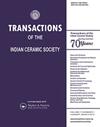两步热压SiC陶瓷的热导率和弯曲强度
IF 1.5
4区 材料科学
Q3 MATERIALS SCIENCE, CERAMICS
引用次数: 0
摘要
研究了两步热压对碳化硅(SiC)陶瓷微观结构、导热性能和抗弯强度的影响。本研究采用氮化铝(AlN)、La2O3和LaF3的新型组合作为烧结添加剂。通过一步(OS样品)和两步(TS样品)热压法制备的SiC陶瓷都表现出较高的相对密度。与OS样品相比,TS样品产生了更精细的微观结构,具有更高的热导率和弯曲强度。采用阻抗谱分析来加强对不同样品热导率变化的研究。根据分析结果,TS样品表现出更高的拟合晶粒和晶界电阻,这代表了更低的空位浓度,表明两步热压更有利于消除SiC陶瓷中的缺陷和提高其热导率。另一方面,TS样品通过更精细的微观结构和SiC-AlN固溶体的形成的综合作用得到增强,从而获得更高的弯曲强度。因此,本研究表明,添加AlN-La2O3-LaF3的两步热压更有利于提高SiC陶瓷的导热性和抗弯强度。图形摘要本文章由计算机程序翻译,如有差异,请以英文原文为准。
Thermal Conductivity and Flexural Strength of Two-Step Hot-Pressed SiC Ceramics
Effects of two-step hot-pressing on microstructure, thermal conductivity and flexural strength of silicon carbide (SiC) ceramics were investigated. A novel combination of aluminium nitride (AlN), La2O3 and LaF3 was employed as sinter additives in this study. SiC ceramics prepared through both one-step (OS samples) and two-step (TS samples) hot-pressing method exhibited high relative densities. Compared with OS samples, the TS samples yielded finer microstructures with both higher thermal conductivities and flexural strengths. Impedance spectroscopy analysis was employed to reinforce the investigation on thermal conductivity variations in different samples. According to the analysis results, TS samples exhibited higher fitting grain and grain boundary resistances, which stood for a lower concentration of vacancies, indicating that two-step hot-pressing is more beneficial to the elimination of defects and improvement of thermal conductivity in SiC ceramics. On the other hand, TS samples were strengthened by a combined effect of finer microstructure and formation of SiC-AlN solid solution, thereby obtained higher flexural strengths. Hence, the present study suggests that two-step hot-pressing is more favorable to the improvement of both thermal conductivity and flexural strength of SiC ceramics with AlN-La2O3-LaF3 additive combinations. GRAPHICAL ABSTRACT
求助全文
通过发布文献求助,成功后即可免费获取论文全文。
去求助
来源期刊

Transactions of the Indian Ceramic Society
工程技术-材料科学:硅酸盐
CiteScore
2.40
自引率
8.30%
发文量
12
审稿时长
2.3 months
期刊介绍:
Transactions of the Indian Ceramic Society is a quarterly Journal devoted to current scientific research, technology and industry-related news on glass and ceramics. The Journal covers subjects such as the chemical, mechanical, optical, electronic and spectroscopic properties of glass and ceramics, and characterization of materials belonging to this family.
The Editor invites original research papers, topical reviews, opinions and achievements, as well as industry profiles for publication. The contributions should be accompanied by abstracts, keywords and other details, as outlined in the Instructions for Authors section. News, views and other comments on activities of specific industries and organizations, and also analyses of industrial scenarios are also welcome.
 求助内容:
求助内容: 应助结果提醒方式:
应助结果提醒方式:


